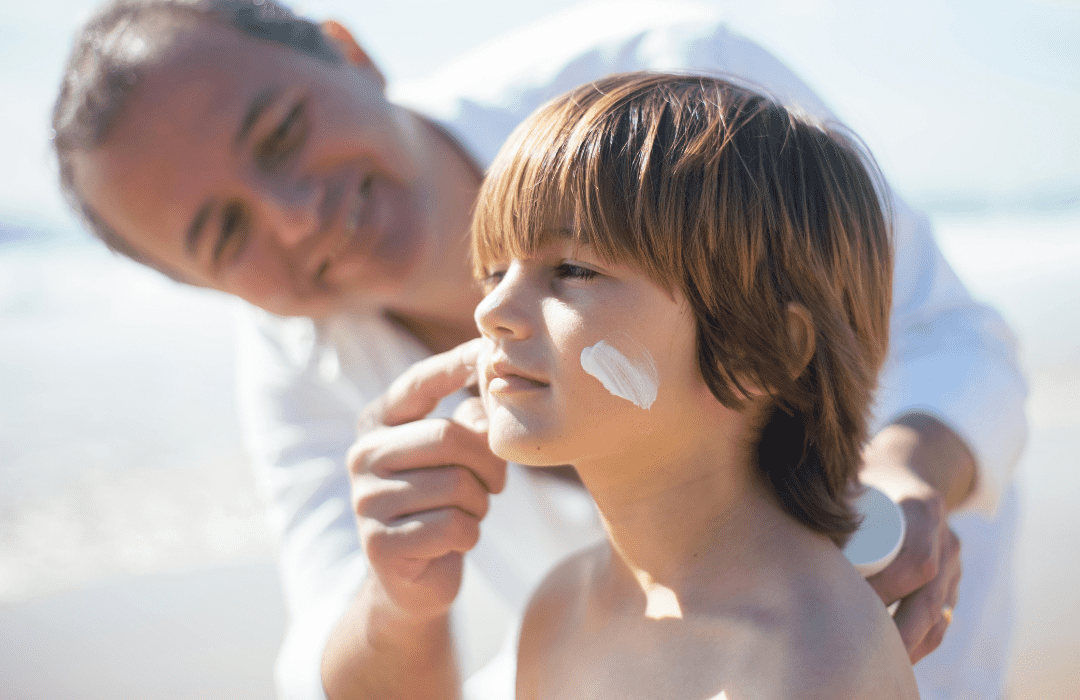



The Science of Sun Protection: Interview with Dr. Richie Chan
21st May 2025


At Alea, we’re committed to helping you make informed health choices backed by trusted medical expertise. With summer around the corner and rising concerns about sun exposure and skin health, we’re diving into a topic that affects us all: sun protection.
With the support of Dr. Richie Chan, Alea shares key infos on sunscreens for your beach days. With deep expertise in skin health and aesthetic medicine, Dr. Chan offers invaluable insights into the science of sun exposure, the safety and effectiveness of sunscreen ingredients, and how to protect your skin while maintaining overall health. Whether you're spending more time outdoors or rethinking your skincare routine, this conversation will help you navigate sun safety with confidence.
1. Why is sun protection so important for our skin, and what are the potential risks of unprotected sun exposure?
Because the sun isn’t just there to make your vacation photos look good—it’s also a stealthy skin saboteur. Unprotected sun exposure bombards your skin with ultraviolet (UV) radiation, which can damage DNA at the cellular level. Over time, this leads to premature aging, pigmentation, sunburn, and most seriously, skin cancer. Think of sunscreen as your skin’s daily bodyguard—it doesn’t stop the fun, but it keeps the bad guys out.
2. How does sun exposure impact skin aging, and what role does sun protection play in maintaining youthful skin?
If wrinkles, sagging, and age spots aren’t on your skincare wishlist, then sunscreen should be your BFF. Most of the visible aging—we’re talking fine lines, leathery texture, and uneven tone—can be traced back to sun exposure. UV rays break down collagen and elastin, the proteins that keep your skin firm and bouncy. Sunscreen doesn’t just prevent burns; it preserves your glow, slows wrinkle formation, and keeps those freckles from multiplying like rabbits.
3. Many people are concerned about the ingredients in sunscreens. What are the differences between chemical and physical sunscreens, and which type do you generally recommend?
Let’s break it down:
-
Chemical sunscreens (like oxybenzone, avobenzone, octinoxate) absorb UV rays and convert them into heat. They tend to be more transparent on the skin but can cause irritation in sensitive types and raise some safety concerns.
-
Physical (mineral) sunscreens (zinc oxide, titanium dioxide) sit on top of the skin and reflect UV rays. They're more photostable, better for sensitive skin, and less likely to cause systemic absorption. Only zinc oxide and titanium dioxide currently have GRASE (Generally Recognized As Safe and Effective) status from the U.S. FDA. If you're ingredient-conscious, sensitive-skinned, or just want to keep things simple, mineral sunscreens are a great bet.
4. Some studies raise concerns about certain sunscreen chemicals being absorbed into the bloodstream. What does the latest research from reputable sources such as the FDA and the American Academy of Dermatology say about sunscreen safety?
Yes, some chemical filters can be absorbed into the bloodstream—but here’s the key point: presence doesn’t equal danger. The FDA acknowledges this absorption, but notes that it doesn’t automatically indicate harm. More research is being done, but there’s no evidence of adverse health effects so far. The American Academy of Dermatology continues to recommend daily sunscreen use, because the proven risk of UV damage far outweighs any theoretical concerns. If you're still uneasy, mineral sunscreens offer peace of mind with a strong safety record.
5. Given that sunscreen can block Vitamin D synthesis, how can people ensure they get enough Vitamin D while still protecting their skin from harmful UV rays?
It’s true that sunscreen reduces Vitamin D synthesis, but not to the point of causing deficiency for most people. You only need a short amount of indirect sunlight a few times a week—say, 10 minutes on your arms while sipping your morning coffee.
And let’s not forget: dietary sources (fatty fish, fortified foods) and supplements are safe, reliable ways to meet your needs without putting your skin at risk. You don’t need to roast yourself under the sun to stay healthy.
6. What are the most effective ways to protect our skin beyond sunscreen, especially in a place like Hong Kong where the sun can be intense?
In sun-drenched places like Hong Kong, sunscreen is just the first line of defense. Add in:
- Wide-brimmed hats (bonus points for looking fabulous)
- UV-protective clothing
- Sunglasses with UV400 protection
- Seeking shade between 10am–4pm (aka The Sun’s Rage Hours)
- Umbrellas—yes, they’re stylish and effective Sun protection is a lifestyle, not just a lotion.
7. How can people incorporate sun protection into their daily skincare routine without feeling overwhelmed?
Easy: treat sunscreen like brushing your teeth—non-negotiable but effortless once it’s a habit. Tips for smooth integration:
- Choose a moisturizer with SPF 30 or above, and make sure it also says PA+++ or PA++++ for UVA protection. Remember: SPF protects against UVB, while PA ratings reflect UVA protection.
- An SPF of at least 30 blocks 97% of UVB rays, which is sufficient for daily use. Higher SPFs block slightly more, but no sunscreen blocks 100%.
- High SPF does not last longer—it still needs to be reapplied every 2 hours outdoors.
- For reapplication, use SPF sprays, cushions, or powders—especially useful if you wear makeup.
- Stash a small sunscreen in your bag, car, or desk—future-you will be grateful.
Sunscreen doesn’t need to be a 10-step ordeal. Just find a formula you love, use enough of it, and reapply as needed. Glowing skin, minus the regrets.
We’re grateful to Dr. Chan for sharing his expert perspective on this crucial aspect of skin health. As we step into the sunny season, sun protection isn't just about avoiding sunburn—it’s about safeguarding your long-term health.
At Alea, we work with 30+ insurer partners and we’re here to help you make smart, informed health choices—from trusted medical advice to choosing the right insurance plan that protects you wherever life takes you.
Looking for life or health insurance for yourself, your family or your team?
Do you already have an insurance policy? You could find a better plan!
Alea brings you choice, unbiased advice and outstanding service, with access to 100+ options from 25+ insurance companies. If you already have an insurance policy, switching insurance policies with Alea doesn’t cost you a thing.
Get free quotes with us today.
An advisor will be in touch to answer all your questions!
This article was independently written by Alea and is not sponsored. It is informative only and not intended to be a substitute for professional advice and should never be relied upon for specific advice.

